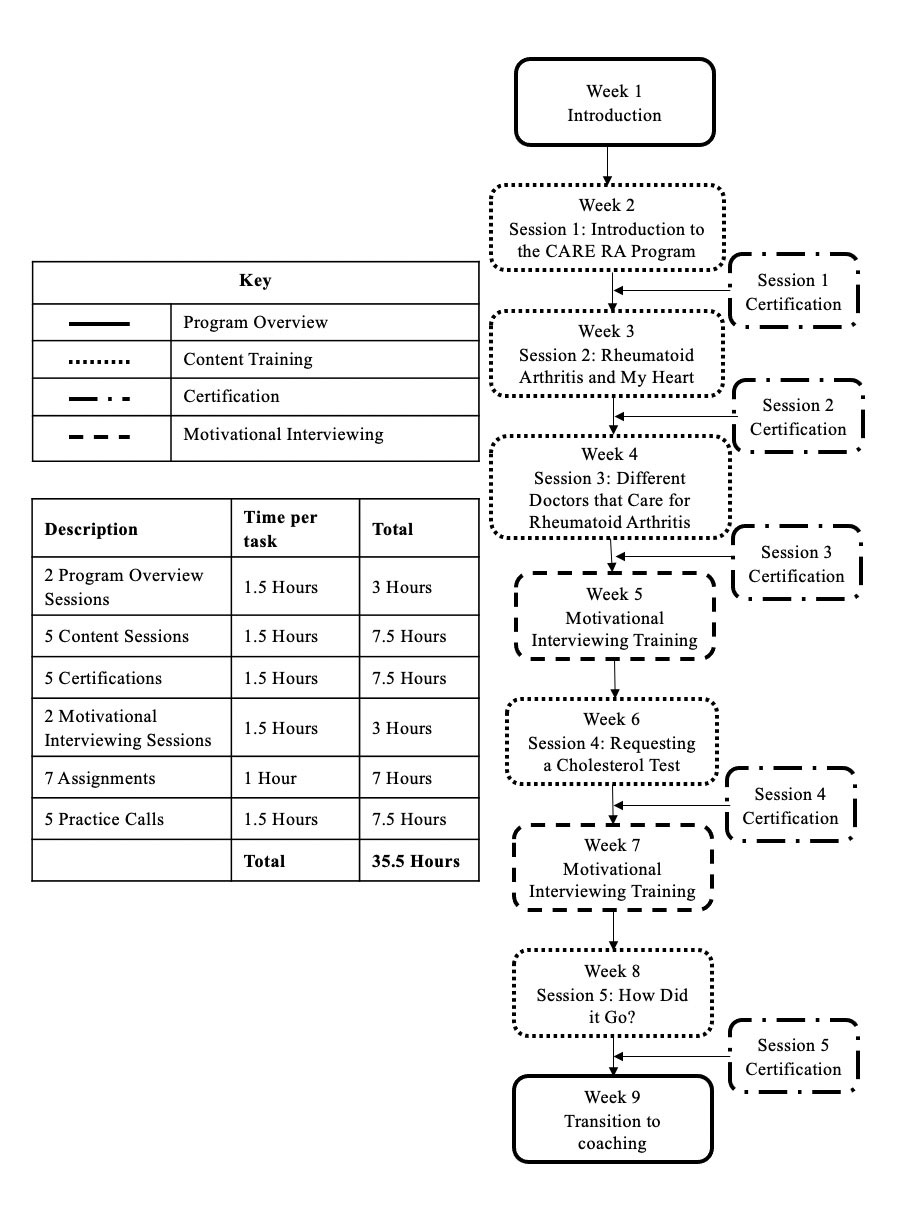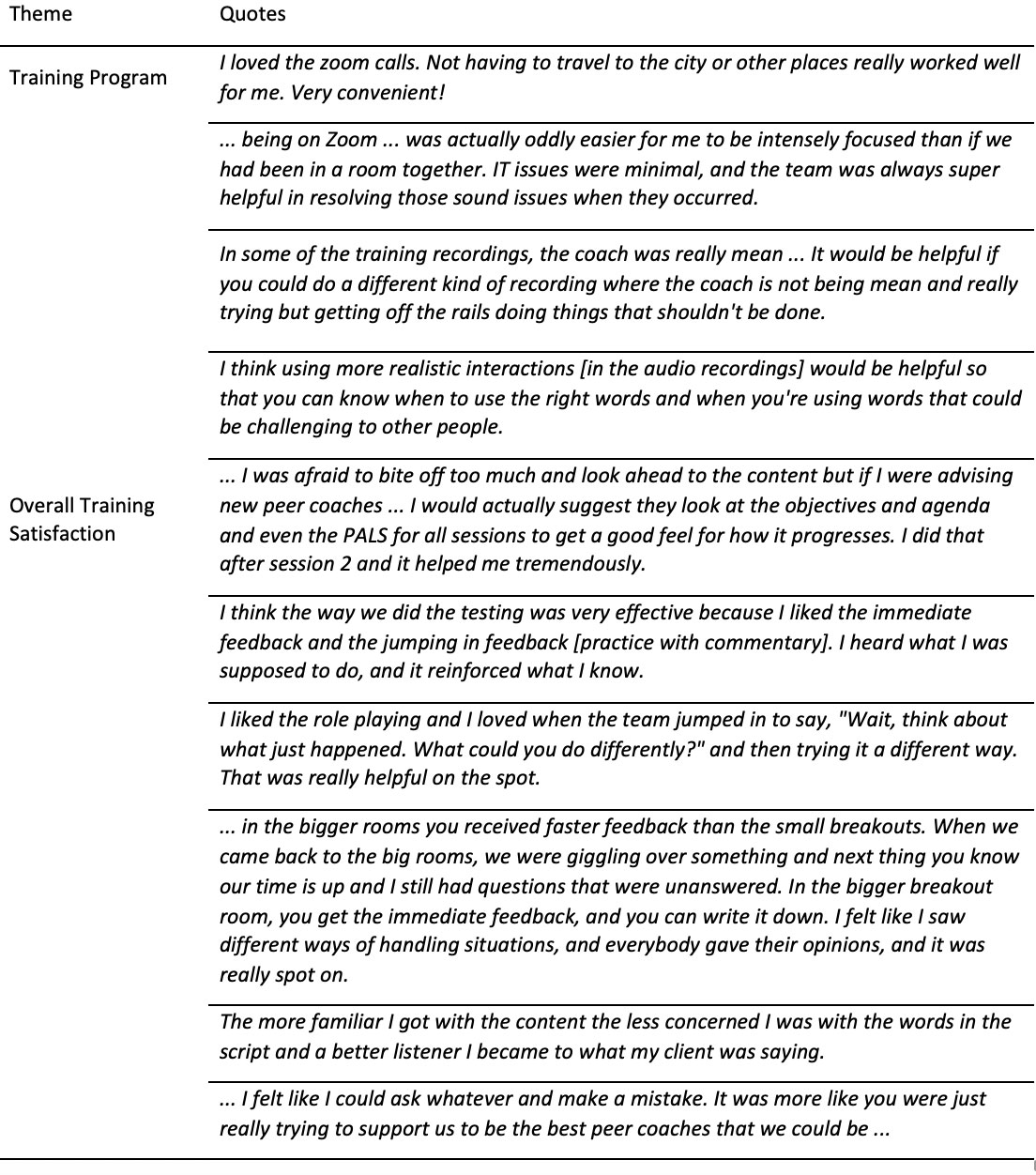Session Information
Session Type: Poster Session A
Session Time: 1:00PM-3:00PM
Background/Purpose: Peer coaching interventions are effective in helping individuals with chronic conditions understand and manage their disease. Most peer coach training programs occur in person, which became and obstacle during the COVID-19 pandemic. In addition, lack of transparency in peer coach training procedures makes replication of successful programs difficult. We present the processes used to train peer coaches virtually to deliver a peer coaching intervention, the CARE RA program, to patients with rheumatoid arthritis (RA), a main component of which was Motivational Interviewing (Mo-INT).
Methods: Individuals with RA between 40 and 75 years old were recruited, interviewed, and trained by the research team (October 2020 – December 2020). Peer coaches were required to have a cholesterol test within the past 2 years or currently be taking a statin. The CARE RA intervention focuses on cardiovascular (CVD) risk assessment for patients with RA, informed by the Social Cognitive Theory. We conducted 7 virtual training sessions through a web conference platform over 9 weeks (Figure 1). Mo-INT, an evidence-based counseling approach used to encouraged behavior change, was applied to train and evaluate the peer coaches in four areas: Listening, Discussing, Practicing, and Certifying. Peer coaches were certified in each training session by role-playing with research team members before moving on to the next session of training. A post-training focus group assessed satisfaction with the training program and intervention development process.
Results: Four individuals (3 female, 1 male) with RA were certified to be peer coaches (Table 1). The average age of this cohort was 52; half were White, half were Black and all completed post-graduate degrees. The average RA disease duration was 10 years. Two peer coaches had cholesterol tests done within 2 years of starting training, 2 had cholesterol tests during training, 1 started a statin. Peer coach knowledge of CVD and Mo-INT skills increased by 18% after training. Peer coaches specified they preferred real-time feedback during Mo-INT sessions and that training was best in groups of 4 versus 2. Strong communication and trust between the team and peer coaches was important for the success of this training program. Peer coaches expressed satisfaction with the training program, confidence in their role as peer coaches, and satisfied with the virtual training format (Table 2).
Conclusion: This virtual peer coach training program for individuals with RA was effective for training individuals on CVD and Mo-INT skills during the COVID-19 pandemic. Our approach represents an opportunity to adapt training that has traditionally been done in person. By doing so, our approach facilitates recruitment and training of a diverse group of peer coaches.
To cite this abstract in AMA style:
Brown M, Domínguez Páez Y, Jabri A, Lui G, Weiner J, Allen A, Sydnor-Campbell T, fritz S, Creasman M, Kasturi S, Safford M, Navarro-Millan I. Virtually Training Peer Coaches to Use Motivational Interviewing Skills: Processes from a Rheumatoid Arthritis Intervention Training Program [abstract]. Arthritis Rheumatol. 2022; 74 (suppl 9). https://acrabstracts.org/abstract/virtually-training-peer-coaches-to-use-motivational-interviewing-skills-processes-from-a-rheumatoid-arthritis-intervention-training-program/. Accessed .« Back to ACR Convergence 2022
ACR Meeting Abstracts - https://acrabstracts.org/abstract/virtually-training-peer-coaches-to-use-motivational-interviewing-skills-processes-from-a-rheumatoid-arthritis-intervention-training-program/



